close 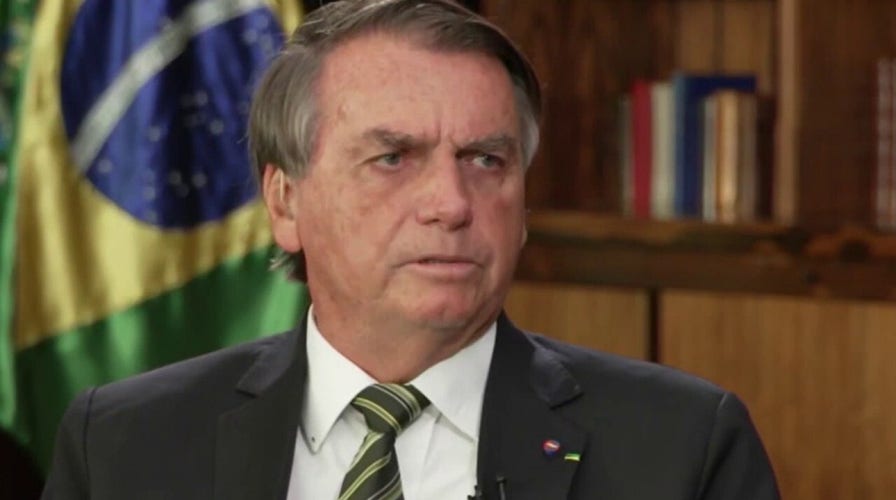
Bolsonaro on how South America being pulled to the left, Brazil loosening gun restrictions
Brazilian President Jair Bolsonaro sits down with Tucker to discuss the protection of life and faith in his country on ‘Tucker Carlson Tonight.’
A gun expert is asking academics to put their money where their mouths are and bet $1,000 on Brazil as a case study that stricter gun laws won’t mean less crime.
No one has taken him up on the bet yet, but some have hit back by calling the challenge a “stunt” and saying they will put cash up if the terms meet their requirements.
Brazil took a hard turn away from gun ownership with a new left-wing presidential administration this year, sparking a debate on whether Brazil’s falling crime rate would increase or continue to fall as it did under former President Jair Bolsonaro.
President Luiz Inacio Lula da Silva was sworn into office in January, and his first order of business was working to reverse the previous administration’s pro-gun policies, including a decree that ordered citizens to register their firearms with the Federal Police, limiting the maximum number of guns a person can own from six to three, and suspending new firearm registrations.
The policies stand in stark contrast to those of Bolsonaro’s administration. Gun ownership increased sixfold in Brazil under Bolsonaro’s tenure, which lasted from January 2019 to December 2022, as the then-president issued more than a dozen decrees that loosened laws around citizens’ access to guns.
BRAZIL’S NEW LEFT-WING PRESIDENT STARTS GUN CONTROL PUSH WITH COUNTRY-WIDE GUN REGISTRATION
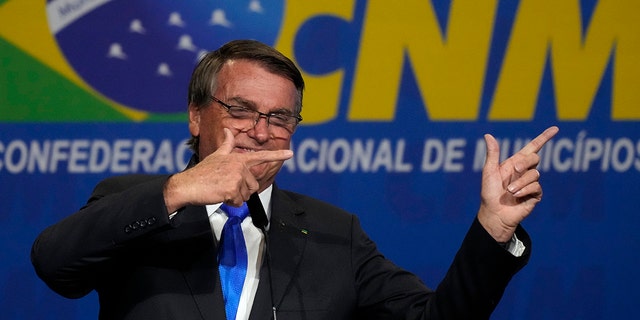
Former President Jair Bolsonaro was the first Brazilian presidential candidate to campaign on a pro-gun platform, saying “good citizens” are entitled to firearms to protect their families and assets. (AP Photo/Eraldo Peres)
In 2019, Brazil’s homicide rate fell by 19% compared to 2018 at 41,635 killings – the lowest murder rate in more than a decade. By 2022, the number of homicides fell to 40,824 in the country.
In December, Johns Hopkins University professor Dan Webster said in an article published in the Washington Post that in Brazil, “every 1 percent increase in firearm ownership is associated with a 0.6 percent increase in overall homicide rates.”
John Lott, an economist and academic who leads the Crime Prevention Research Center (CPRC) – which for years has researched and argued that an increase in firearm ownership does not mean higher crime rates – read Webster’s December comment and said it partially motivated him to embark on a betting challenge with fellow gun and crime researchers.
BRAZIL’S NEW LEFTIST GOVERNMENT MOVES TO TAKE GUNS BACK AFTER SURGE IN PURCHASES UNDER BOLSONARO
“How could somebody with a straight face go and tell the Washington Post this is what he believes the relationship is,” Lott told Fox News Digital. “Nobody calls him on it. It was kind of what I finally saw his statement in the Washington Post, that’s what kind of got me to go and offer people the bets.”
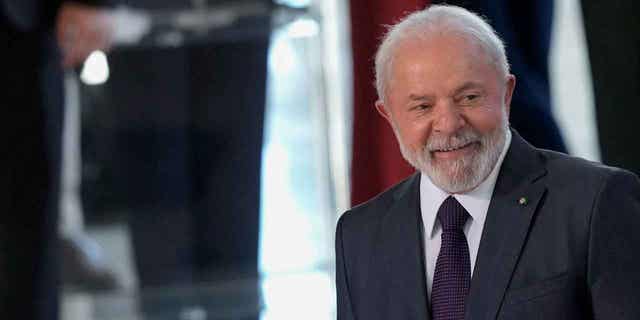
Brazilian President Luiz Inacio Lula da Silva (AP Photo/Eraldo Peres/File)
Lott said he reached out to 12 academics in the U.S. earlier this year with a proposal: A $1,000 bet on whether the homicide rate would increase in Brazil under Lula and his administration’s gun ownership crackdown.
“Here is what I offer you. Let’s bet $1,000 and make it simple on whether the homicide rate in Brazil will go up or down during the first two years of Lula’s presidency. If the homicide rate goes down from what it was in 2022, I will pay you $1,000. If it goes up, you will pay me $1,000,” Lott wrote in his emails to fellow academics, which were provided to Fox News Digital.
“If you prefer, we can designate charities that we want the money to go to. Given the importance you put on gun control and the large percentage change in gun ownership that Lula is imposing, you should expect a substantial drop in homicides, but, as I say, let’s keep it simple on whether the homicide rate goes up or down.”
BRAZIL’S FORMER PRESIDENT BOLSONARO APPLIES FOR US TOURIST VISA: REPORTS
Lott published an op-ed about the bet on The Federalist last week, noting that seven of the 12 academics didn’t respond to his offer while the other five did not take him up on the bet.
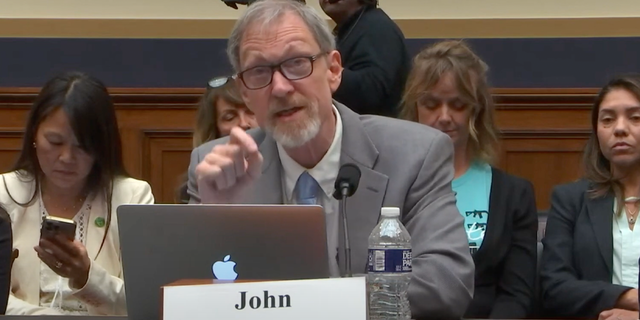
Dr. John Lott (Congress.gov)
“These academics have no problem confidently making predictions for the press or legislative committees about the future effects of gun-control laws. But they aren’t willing to put their money where their mouths are in a way that would make people remember their bad predictions. Maybe that’s because they already know the crime-fighting benefits of private gun ownership,” Lott wrote in the op-ed.
Lott provided Fox News Digital with his correspondence with academics, including Duke University professor Phil Cook, for example, who told Lott, “I like the idea of a bet, but am not going to take this one, since I have no confidence that guns and ammo will actually become scarcer in the neighborhoods with high rates of violence.”
Indiana University’s Paul Helmke told Lott that he’s “not in the practice of making bets,” and while it “sounds like some interesting developments in Brazil,” Helmke said he is not familiar enough with the country’s data collections and crime issues.
Lott cited Webster’s comment to the Washington Post in his op-ed, noting that under the Johns Hopkins University professor’s prediction, there should have been a 360% increase in homicides in Brazil based on the 600% increase in gun ownership.
BRAZIL TO COMBAT CRIME BY LOOSENING GUN CONTROL
“If that were true, an over 600% increase in gun ownership should have resulted in a more than 360% increase in homicides, not a 34% drop. Instead, the researchers attributed the drop to a slight decline in the 12-to-29 age group’s population share and ‘a decade of investment in policing’ in some parts of the country, even though murders fell in all but one of the country’s 26 states,” Lott wrote.
The CPRC chief added that before Bolsonaro took office in 2018, “The homicide rate stood at 27.8 per hundred thousand people – 5.5 times higher than the U.S. rate” before falling to 18.5 in 2021 – a rate the country had not seen since the early 1990s.
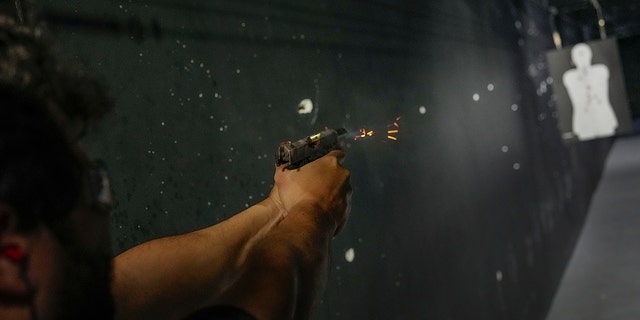
Mauricio Miranda takes shooting lessons at a club in Sao Paulo, Brazil, on Oct. 25, 2022. (AP Photo/Matias Delacroix)
A handful of the 12 academics responded to Fox News Digital’s inquiries on the bet, including Stanford University’s John Donohue, who said he rebutted Lott with previous crime data from Texas in the 1990s.
“I asked him why when Texas prohibited gun carrying for protection, Houston and NYC had the same murder rate in the early 1990s, but when Texas changed to be very permissive towards guns, Houston now has a murder rate three times as high as NYC. John was unwilling to concede that the pro-gun shift had hurt Texas, saying that other factors explain why it has done so poorly relative to New York,” Donohue told Fox News Digital.
EDUARDO BOLSONARO: INCREASING GUN ACCESS HAS REDUCED VIOLENCE IN BRAZIL
“But the same would be true for Brazil. Many factors will influence crime in this relatively poor country that is going through a politically and economically turbulent time,” he added.
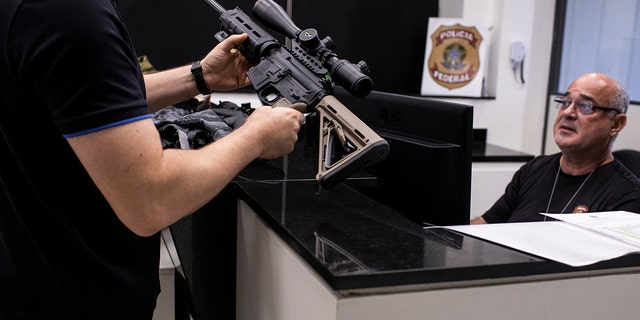
A gun owner holds a weapon as a police officer registers his firearm with the Federal Police in Rio de Janeiro on April 3, 2023. (AP Photo/Bruna Prado)
Other academics characterized the bet as “silly” and a “stunt” and noted they seldom place bets, especially on the “future rates of violence or gun violence.”
“I, for one, do not make predictions about the future rates of violence or gun violence. In the course of my lifetime, I’ve seen huge swings in violence rates in the United States, driven by changes in culture, demography, civil unrest and law enforcement,” Cook said, pointing to how recent history has shown that homicide rates have exploded or halved in ways that were not foreseeable and could not be attributable to gun ownership.
BRAZIL PROSECUTOR’S OFFICE SEEKS SUSPENSION OF GUN DECREE
“Predicting the gun violence rate five years from now in the U.S. or Brazil or anywhere else is a fool’s errand,” he added.
University of California, Davis, professor Garen Wintemute told Fox News Digital that not taking the bet was “not about Brazil,” and he included a link to a 2022 New Yorker piece on Lott and conservatives’ support of the Second Amendment. UCLA professor Adam Winkler said he was willing to take the bet, a wager he called “foolish” “but sought different terms” and that murder rates are caused by a handful of variables beyond just firearms.
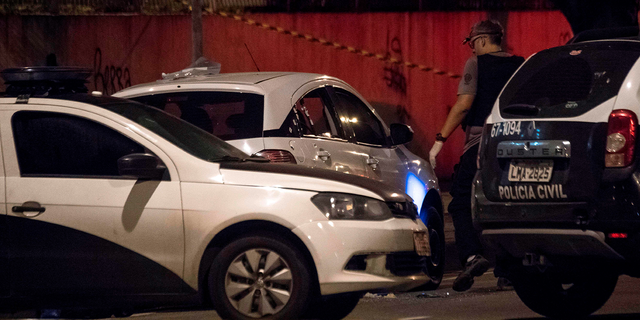
Police investigate at Brazilian politician Marielle Franco’s car, where she was found shot dead in Rio de Janeiro on March 15, 2018. (Getty Images)
Lott argued that one of the reasons researchers should study Brazil is due to the country’s “huge changes” to its laws, “from a [600%-plus] increase in gun ownership to a ban on gun and ammunition sales and forcing people to give up guns that they have already.”
“The idea of a bet is to see what happens before and after a change in gun control laws. The U.K. had much lower murder rates than the U.S. before they had any gun control laws, and their murder rate has actually gone up relative to the U.S. after they adopted gun control laws, such as the 1997 handgun ban,” Lott told Fox News Digital.
Harvard University’s David Hemenway told Fox News Digital that Lott’s proposal was a “silly stunt” and that homicides in Brazil are affected by “scores of factors,” such as “the economy, truces among criminal organizations, gun smuggling rates and police effectiveness in enforcing the gun laws.”
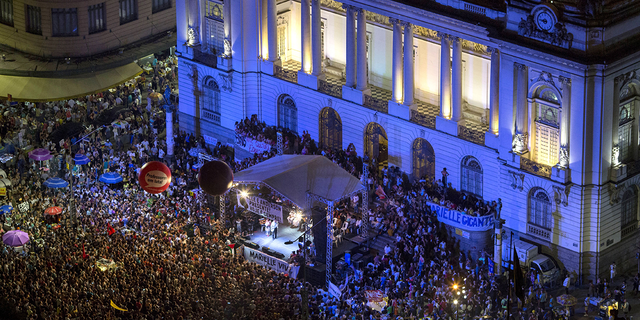
Protesters attend a demonstration against the murder of Brazilian council member and activist Marielle Franco in front of the Municipal Chamber in Rio de Janeiro on March 20, 2018. (Getty Images)
Hemenway said he would take Lott up on a bet if he gets to choose the parameters.
“I know little about Brazil, but for the US, there are scores of gun-related bets I would be delighted to make with Lott – if I get to choose the few guns-strong gun laws position – e.g., which country will have a lower homicide rate next year – the US (lots of guns, weak gun laws) or the UK (few guns, strong gun laws). Or which state will have lower homicide and/or suicide rates next year – Massachusetts (few guns, strong gun laws) or Arizona (many guns, weak gun laws)?” Hemenway wrote in an email.
CLICK HERE TO GET THE FOX NEWS APP
Four academics to whom Lott reached out did not respond to Fox News Digital’s request for comment on the bet, including George Mason University’s Chris Koper, Boston University’s Mark Siegel, Rand Corporation’s Andrew Morral and the University of Chicago’s Jens Ludwig. University of California, Berkeley’s, Franklin Zimring told Fox he never received Lott’s emailed proposal despite Fox reviewing such emails to the professor.
“If [the bet is] so silly, why has the media had all these news stories, both when Bolsonaro had huge changes in the policy and when Lulu has changed it back? And why do these guys … like Webster make the comments that they do? They make predictions. They have no problem making predictions,” Lott said.
